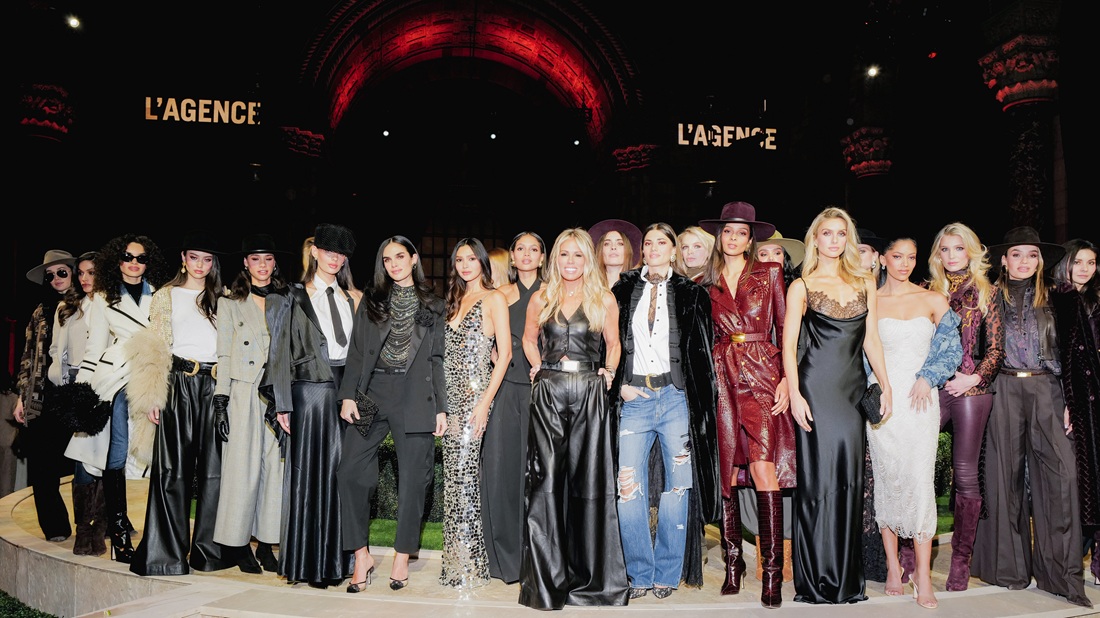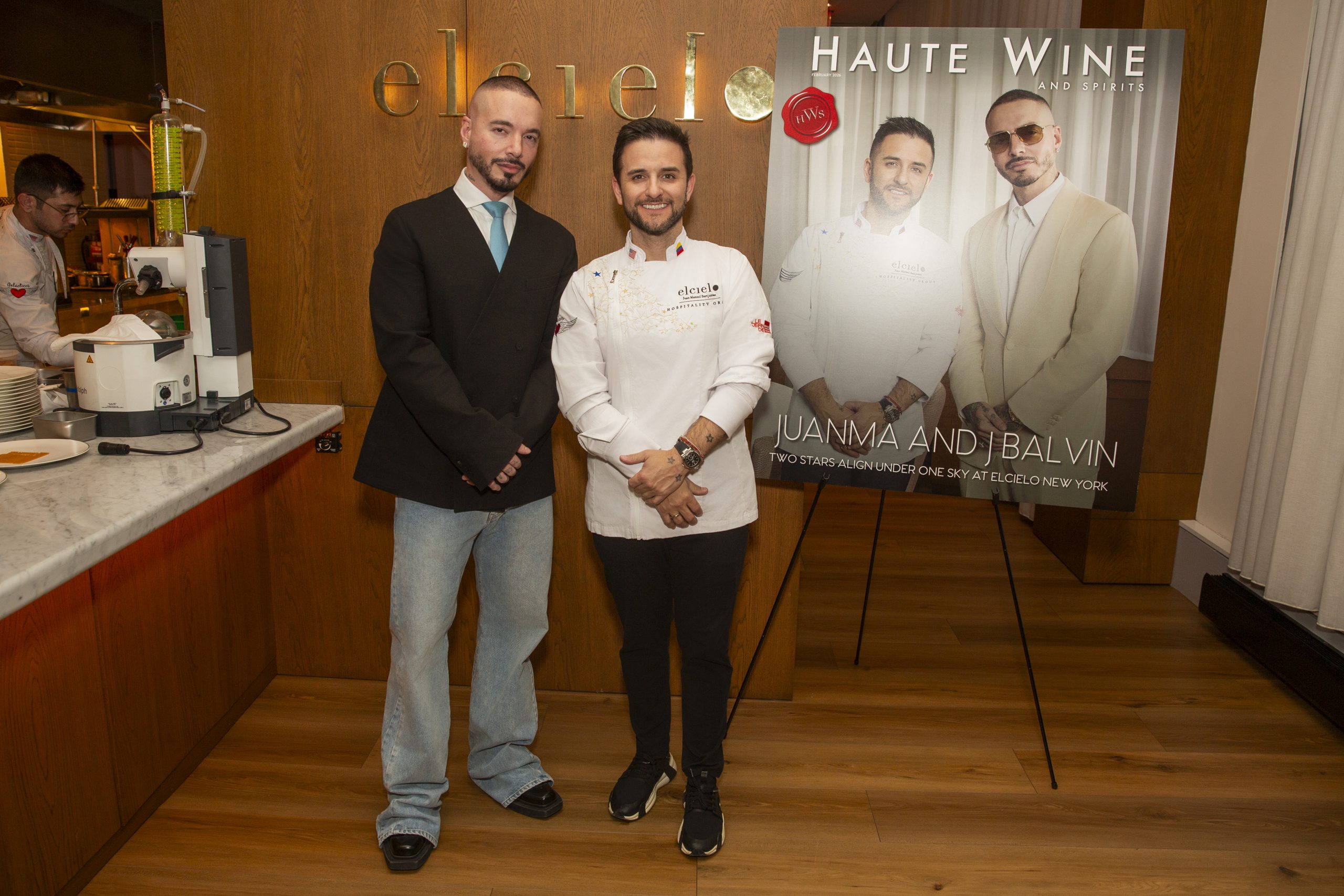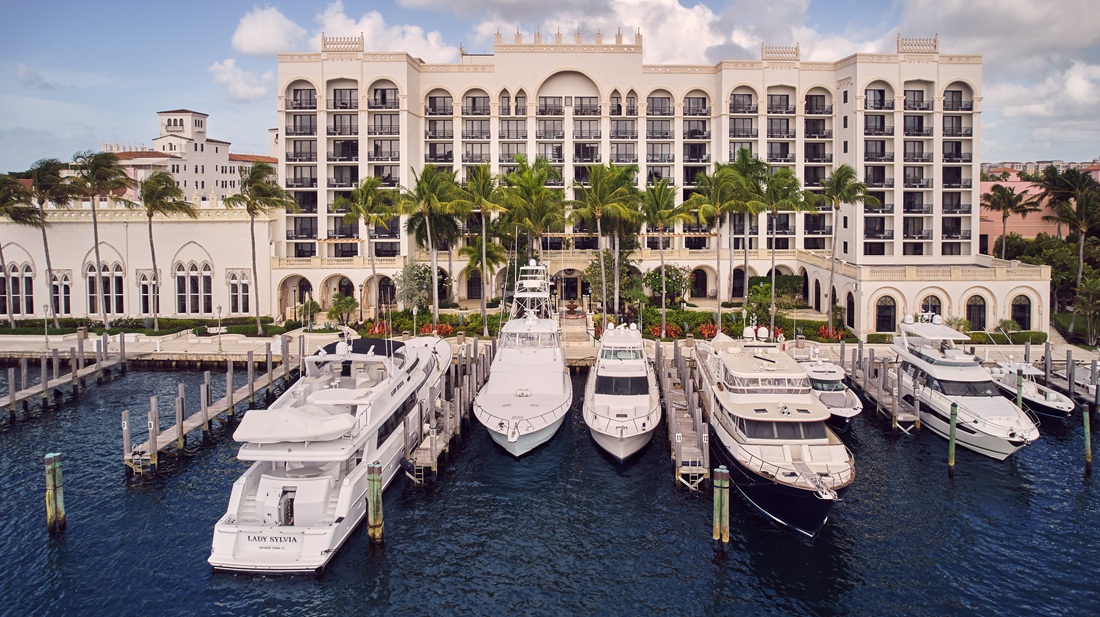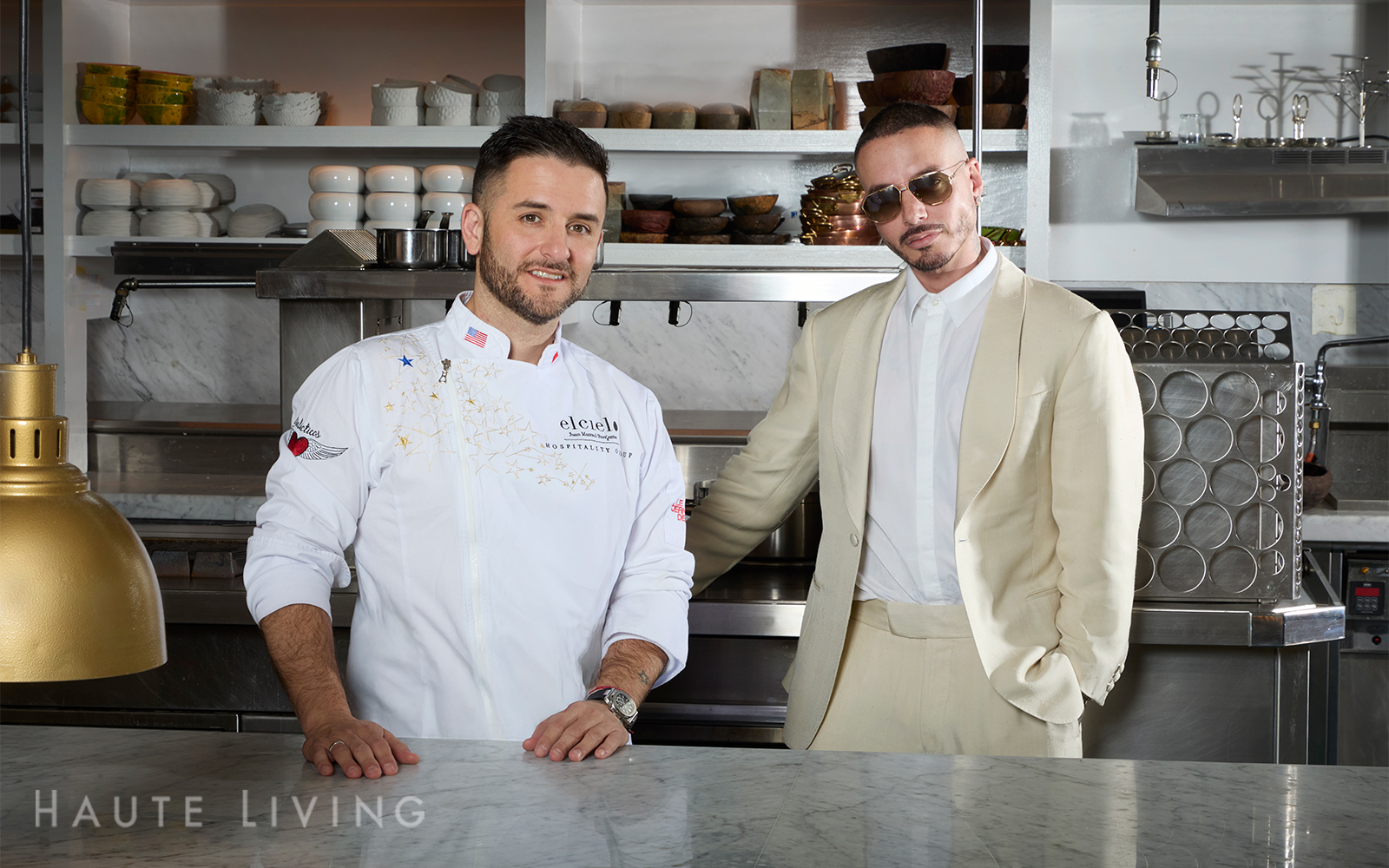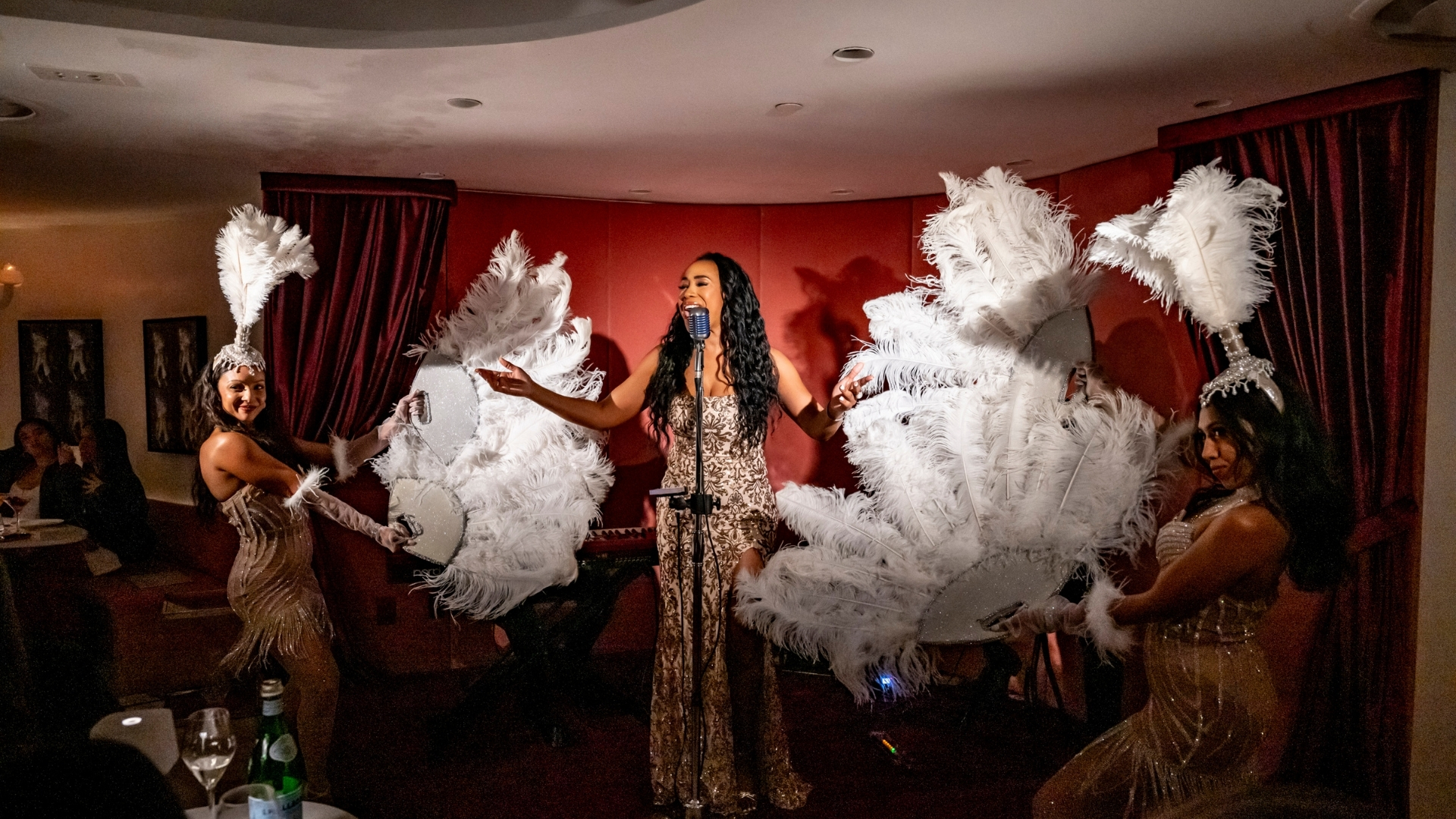Jean-Georges Vongerichten Is Back And Better Than Ever With His Most Ambitious Project To Date On Its Way
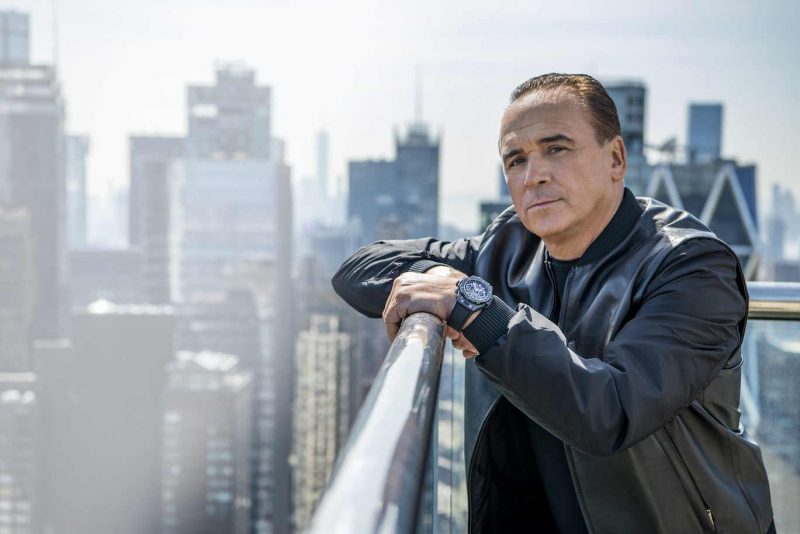
Photo Credit: Scott McDermott
JEAN-GEORGES VONGERICHTEN HAS BEEN ON LOCKDOWN IN THE BIG APPLE — AND IT WAS JUST WHAT HE NEEDED TO REMIND HIM WHY HE FELL IN LOVE WITH THE CITY THAT NEVER SLEEPS.
BY LAURA SCHREFFLER
PHOTOGRAPHY SCOTT MCDERMOTT
GROOMING CHICHI SAITO FOR ART DEPARTMENT USING ORIBE AND BABOR
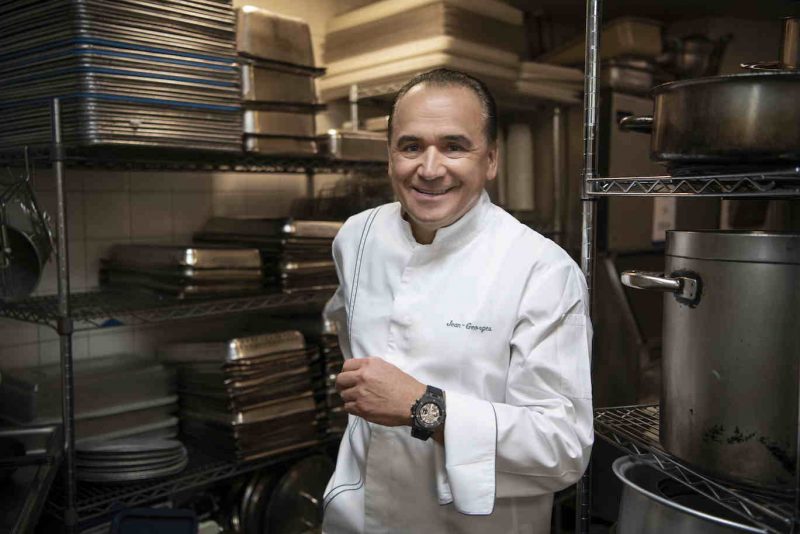
Photo Credit: Scott McDermott
When New York went into a two-month lockdown just days after his 63rd birthday, two-Michelin-starred chef Jean-Georges Vongerichten found himself in a highly unusual predicament: he had to cook at home.
One might not expect this to be an issue for a man with 42 restaurants around the world to his name. But for Vongerichten, who had never prepared anything but coffee in his West Village pad (and who’d never had to, given that he owns 14 restaurants in New York City alone), it was a problem. The last year has tested us all in new and unusual ways — including some that may not immediately seem obvious.
“I cook for my friends and family at my house in the country [in Westchester County], but never in my New York apartment,” the French-born chef explains. “I’m usually in the office by 9 o’clock, at the restaurant by noon, and we never go home before 11 or 12 o’clock at night. I had nothing at home [because] I never needed anything. So I had to buy a coffeemaker. I had to replenish my apartment. Amazon helped me a lot. I was probably the last person in New York still buying his toilet paper.”
Like all of us, he pivoted. The first meal he prepared for himself at home was simple but perfect. Instead of sending a staffer, he went to the market himself. He bought organic eggs, mushrooms, spinach and Gruyère. He made do with the four burners he has in his kitchen, instead of the 14 you would typically find at one of his restaurants. He finally used all the brand-new equipment that had been sitting there unused and restless — and he got back into the habit of cleaning up after himself, too.
“It was a learning curve,” he admits. “At home, you’re on your own: you have to clean, cut, peel, chop. [And what I found was that] it was actually fun.”
But Vongerichten, who has spent the better part of 20 years traveling at least ten days a month, made the executive decision to stay in the city while many left because he wanted to support small businesses, from the farmers at the farmers’ market to local eateries in his neighborhood by ordering to go. And because he stayed, what he found was pleasure in relaxing, rejuvenating and reconnecting. “The first month [of lockdown], I had a Negroni or a cocktail with friends on Zoom every night at sunset,” which provided an added bonus: “I learned how to drink again! Usually I’d have a glass of wine when the day was done, but I found myself having an aperitif at 6 o’clock and getting in bed by 8:30.” (He favors “old school” wines but enjoys trying new things — Rieslings from his home region of Alsace; Meursault, Bordeaux or champagne, also all from France; an Oregon pinot noir; Gruner Veltliner from Austria; a rosé when the weather is warmer.)
And after years of catching only snippets of news or basketball games, he got to explore Netflix, and he also finally used his AppleTV+ subscription. “Ozark, Lupin, The Queen’s Gambit — I watched everything, including, wait for it, Emily in Paris and Bridgerton. I had never watched Chef’s Table before, so I took this opportunity to [watch it, and I also] rewatched a lot of old French films that I hadn’t seen in years, such as Belle du Jour. Watching movies was a new thing for me. When you live the restaurant life, the chef life, you don’t have the time.”
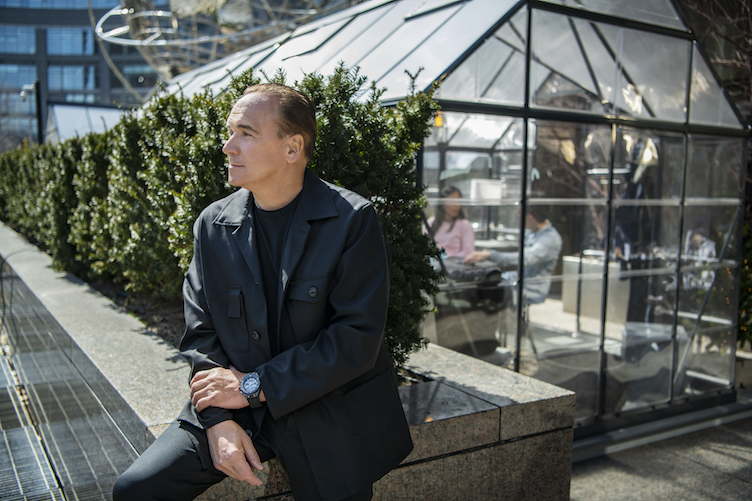
Photo Credit: Scott McDermott
Time for movies, cocktails or much of anything, if he’s being honest. “When you work in the restaurant industry, you are on the go all the time. I rarely have the opportunity to stop and look from the outside in. [Over the last year] I took the time to think about everything at the restaurants, pay more attention to the details. It made me take a step back and take my time understanding how and when we were going to reopen safely. It was really a time of reflection for me,” he explains.
This professional life on the go is one he’s been living for almost 40 years. But his epicurean dedication started much earlier: enjoying perfectly prepared fare was a focus in his childhood home on the outskirts of Strasbourg. In fact, his 16th birthday gift was a meal at the three-star Michelin-rated Auberge de I’lll in Alsace, where he actually began his training, in a work-study program as an apprentice to chef Paul Haeberlin. He then went to work with Paul Bocuse at L’Oasis in southern France before helping chef Louis Outhier open ten restaurants in Asia, including at the Mandarin Hotel in Hong Kong, the Meridien Hotel in Singapore and the Oriental Hotel in Bangkok. He arrived in the United States in 1985 to work at Le Marquis de Lafayette in Boston before taking a position at Lafayette in New York’s Drake Swissôtel, which is where he met the financiers who would change his life even further. With the assistance of Bob Giraldi and Phil Suarez, he opened his first restaurant, JoJo, in 1991 (JoJo was his childhood nickname).
And from there, he was off and running, a culinary star on the rise who would eventually build everything that exists today — the aforementioned 42 restaurants in hot spots including Los Angeles (Jean-Georges Beverly Hills and the Rooftop by JG), Miami (Matador Room, Market at Edition and Tropicale) and Las Vegas (Prime Steakhouse and Jean-Georges Steakhouse), as well as beautiful new locations like Keswick Hall in Charlottesville, Virginia; five James Beard Awards, including the 1998 accolade for outstanding chef; six cookbooks, the most recent of which was 2019’s JGV: A Life in 12 Recipes; and, most important, becoming a household name.
His global empire has mightily borne the weight of the Covid-19 lockdown, luckier than most in that it has come out mostly unscathed. Vongerichten deserves much of the credit. He used the smarts and the skills that have made him into not just one of the world’s best chefs but also one of its most successful restaurateurs: he watched, he listened, he learned. He knew the coronavirus would head west, as he had already shuttered his three restaurants in China— Shanghai’s Jean-Georges and Mercato, as well as Mercato Guangzhou — two months earlier.
“We knew what path we were on,” he says. “Our last day of service was March 14 [two days prior to New York state’s official lockdown announcement on March 16]. But still, my heart stopped, because literally everything was closed.”
On March 16, 2020, Vongerichten celebrated his 63rd birthday quietly at Japanese eatery Omen Azen in SoHo, then hunkered down at home, also quietly, and prepared to pivot in a way that was far less enjoyable than flexing his at-home cooking skills or chilling with Netflix: he needed to put together a preventative strategy to keep his businesses secure.
“I was in the office four days [after the lockdown was announced],” he admits. “I couldn’t say home. I did my first Covid test the week after the shutdown and have done them biweekly [for the last year]. We jumped right back into doing what we do.”
From his Asian eateries (which also include Vong Kitchen in Indonesia, JG Tokyo in Japan and the Dempsey Cookhouse and Bar in Singapore), he and his staff instantly deployed Quick Response (QR) code, a two-dimensional version of the bar code that allows for easy menu access and more. “In Asia, they’ve been through SARS and many other pandemics in the past, so when people are sick, they automatically wear a mask out of respect to other people. So we learned how to deal with it. We were lucky to have that contact with Asia. We were literally sending our recipes via QR code to Shanghai the year before the pandemic, so we had more hope than anybody else to come back quickly.”
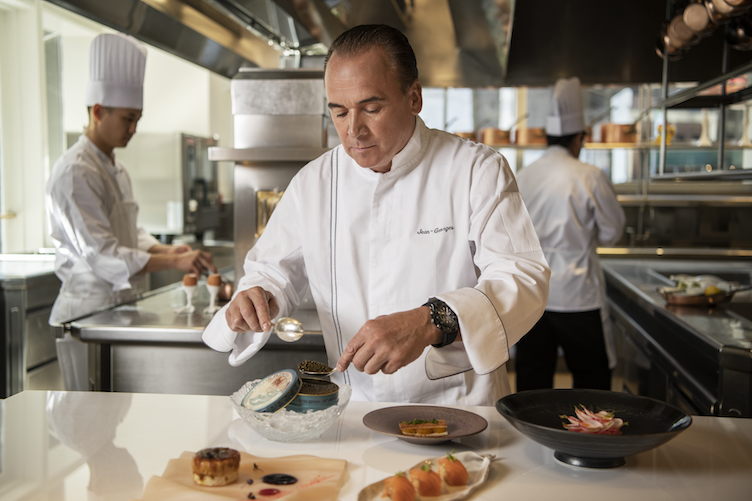
Photo Credit: Scott McDermott
“Quick” is an understatement. By summer 2020, his 14 New York City eateries — the aforementioned JoJo (yes, it’s still thriving today); contemporary trading post ABC Cocina; organic-focused ABC Kitchen; plant-based ABCV; his signature, two-Michelin-starred eatery Jean-Georges; Nougatine, the casual sister of Jean-Georges, with a lively bar scene, and its companion, Terrace at Nougatine; Louis, a multifaceted concept with a grocery, coffee shop, luncheonette and market; relaxed and elegant West Village eatery Perry St; Public Kitchen, at the Public Hotel on the Lower East Side; the Mark, located at the Mark Hotel on the Upper East Side; the chic and sophisticated Mercer Kitchen at the Mercer Hotel in SoHo; romantic, seafood-focused the Fulton at Pier 17; and Paris Café and Lisbon Lounge, both at the TWA Hotel at John F. Kennedy Airport — as well as Jean-Georges at Topping Rose House in Bridgehampton and the Inn at Pound Ridge in Westchester were focusing on outdoor dining with creative terrace space and to-go services.
At the same time, he also — amazingly — opened two restaurants: L’Italien and L’Asiatique at the storied five-star La Mamounia hotel in Marrakesh, Morocco.
“We signed a new deal in mid-April 2020 and, believe it or not, opened two restaurants over Zoom while everything was shut down in New York. We hired two chefs and a manager this way. We trained the entire kitchen staff with videos and recipes over video calls…and we were 95 percent there by the time we opened the door,” he says.
It was much more labor-intensive to open a restaurant this way, but a guy’s got to do what a guy’s got to do. Usually, Vongerichten explains, it takes a few weeks to get everything up and running, especially with his hands-on approach. Remotely, a few weeks turned into a few months.
Because of travel restrictions, he was only able to visit the property a week before its mid-October opening and finally meet the staff in person. He acknowledges that there were “a few adjustments” but also marvels, “in the end, the only thing that was really missing was a food test. We couldn’t test the flavors, but our recipes are very precise. Maybe that’s the next step: maybe we’ll find a way of smelling and tasting things remotely, like a scratch ’n’ sniff perfume ad. Maybe one day we can smell our food from a distance,” he muses with a laugh.
Regardless, it takes a pretty particular type of person to successfully open two feted restaurants during a global pandemic, and he’s proud of this accomplishment. “It’s pretty amazing what you can do by communicating long-distance,” he says. “I had never done that before in my 45 years of cooking. It was pretty special.”
When I sit down with Jean-Georges virtually on March 12 at his namesake New York eatery on Central Park West, he’s in great spirits. Manhattan is sunny, the sky is blue, he’s just had his second Covid-19 vaccine, and life is finally getting back to semi-normal.
“We’re bouncing back slowly, but it was a fight,” he acknowledges, noting, “I wouldn’t have been able to get through this past year without the support of my team and family. I am just one person and I owe it to them, from my children to my brother to the dishwashers to my business partners. Together, we all were able to get us back to a place where we could see the light at the end of the tunnel.”
The biggest change at the moment is his physical location. He has not spent this many consecutive days in New York for years, and, like most who spend their life on the go, he’s starting to get itchy.
“To me, the greatest luxury in life is the opportunity I have to travel and make connections with people around the world,” he says. “I am always inspired by my travels, the people I meet, the things I eat, the new flavors and ingredients I discover. It keeps me going, it keeps me challenged, and it keeps me wanting to learn more. Whenever I travel, I always meet people who teach me something, whether they’re locals or people who work in the industry. It’s a priceless experience. I have always been thankful that I’m fortunate enough to travel, but since the pandemic, my appreciation has only grown. Something that became a regular part of my life was suddenly removed, and it’s in moments like these, you only come to appreciate it even more. I haven’t had jet lag for a year, and I miss it!”

Photo Credit: Shop Architects
Now, before you go calling the man crazy, hear him out. “It’s the only time — especially when you’re on a 15-hour flight to Shanghai — that no one can send you a text. There’s no WeChat, WhatsApp or fax. No one can ask you questions. There is only, ‘What do you want to eat and drink? Do you want another glass of champagne? Put your seat belt on.’ It’s a time you can really reflect, sleep, catch up with yourself, watch a couple of movies.”
Some might argue that he’s had nothing but time to reflect in the last year, but I understand. It’s different. Here, in New York, he is always connected, always on. There are constant worries and concerns to assuage, logistics to discuss. It’s only when he’s in flight, on longer trips to Asia or Europe, where he operates Jean-Georges at the Connaught and the Connaught Grill in London and Market in Paris, that he can truly relax.
Plus, like many successful businessmen, Vongerichten thrives on routine, which also serves to foster his creativity and inspiration. A normal month in his life pre-Covid would have included seven to ten days of travel. In March, he’d land in northeast Asia — from Tokyo to Shanghai to Guangzhou to Hong Kong and back. April was for Europe, starting in London, followed by the Eurostar to Paris. Every month there was a different continent. “For me, traveling meant exploring different markets around the world. We’d go out to eat every day and come back to New York with 30 or 40 new ideas, new combinations, new things we tried on the road. We’d always come back with so much inspiration.”
He acknowledges that he can get inspired remotely, on Instagram (and does), but nothing compares with the real deal. But then, he has the real deal right here in New York City. For although he loves exploring new cuisine around the world, there is nothing he loves more than the Big Apple — and the 14 restaurants he has here, plus a 15th on the way, prove it.
“New York has the best of everything,” he declares. “You can choose what you want to be. It has the best of everything to offer in every single neighborhood, and it’s inclusive, a place of creativity with a landscape of different ethnicities coming from everywhere.”
The City that Never Sleeps also, unsurprisingly, houses the restaurant of his that he feels is most reflective of himself: Jean-Georges, the high-end eatery he opened in 1997 to rave reviews (including four stars from The New York Times, three separate times) that is considered to be, by most, the crown jewel of his empire. It’s a restaurant where men wear jackets to dine on two-Michelin-starred seasonal fare that exquisitely blends the best of French, American and Asian cuisine. It’s endlessly chic, thanks to an intimate dining room designed by Thomas Juul-Hansen, with custom lighting by L’Observatoire and floor-to-ceiling windows that offer picture-perfect views of Central Park and Columbus Circle.
“All of the restaurants reflect my personal style; they have my DNA in them,” he says. “[But] Jean-Georges is the only one where we offer a tasting menu, and I believe that food is to be shared. Plus, the way I enjoy eating is by having a little bit of everything.”
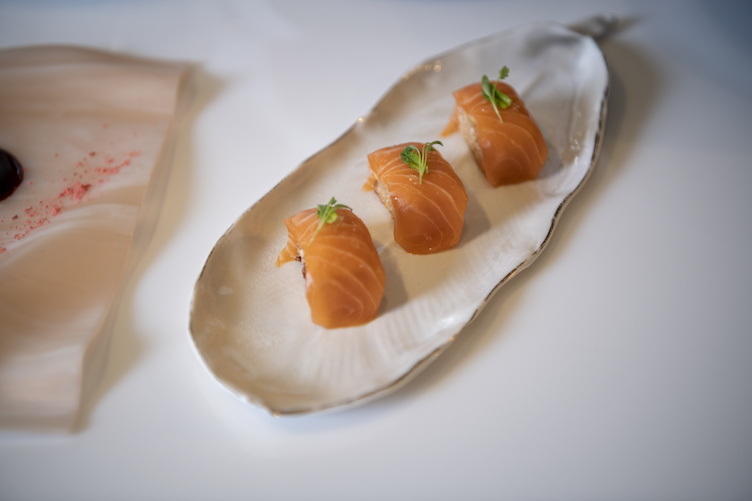
Photo Credit: Scott McDermott
Which brings me to the rationale behind his greatest undertaking yet: the behemoth food hall Tin Building at South Street Seaport, adjacent to Pier 17. “It was an old fish market that existed for 85 years, and about 20 years ago, it moved to the Bronx,” he says. “The building was closed, dangling, almost hanging over the river, so we decided to redevelop it. It will be a food hall, a bit like Eataly here in New York or Harrods in London. We’ll have many different venues in there, including a barista, a bakery, a flower shop, an egg counter, a raw bar, a brasserie, a small Japanese restaurant, a deli and a candy store. On the second floor, we’ll have Italian, tacos, a beer garden, a vegetarian restaurant and a Chinese restaurant. It’s going to be a collection of all the types of food that have passed by there for the last 200 years. It’s my first food hall ever.”
The project is a massive undertaking — it’s a 55,000-square-foot space — that he’s been working on for the past six years with his partner, Howard Hughes. “We have something really spectacular, really unique here. It’s the biggest project we have ever taken on, and it’s very complicated to do because we are recreating the entire space,” he says. “We had to dismantle the building, but we made sure to keep all the walls because it’s a historical landmark. We had to cut the platform — we even had a diver going underwater cutting every single piling at the mud line! — and replant a pile of concrete and steel into the river. It was definitely a labor of love.”
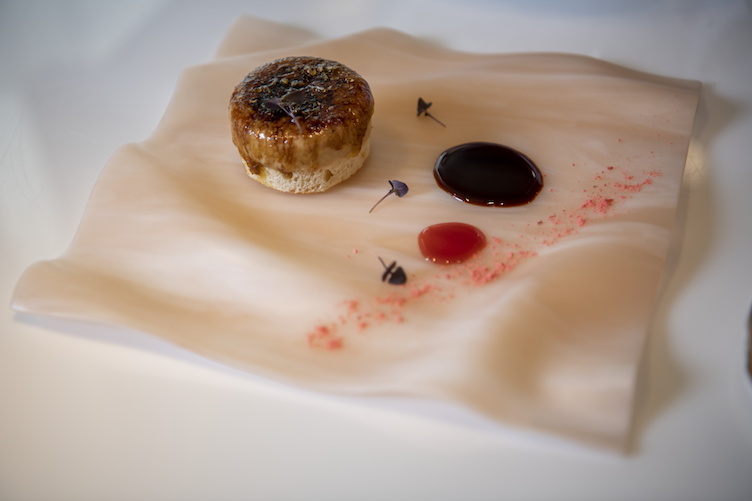
Photo Credit: Scott McDermott
Currently, he’s designing the interiors with Roman and Williams, the architecture firm responsible for hot spots like Le CouCou and Dirty French, a “great firm that really understands New York”; the project is on track to open next year.
And although he feels an affinity with restaurant Jean-Georges, this might be his most deeply personal project to date. “This was actually the first place I went to when I arrived in New York in 1986. I went to this fish market the next day at 3 in the morning. It’s a really great memory for me.”
Just like his 64th birthday. Nearly one year to the day after ringing in his 63rd with an imminent lockdown and uncertainty, he recently celebrated in hopeful style: with a vaccination, champagne and caviar, and close family and friends.
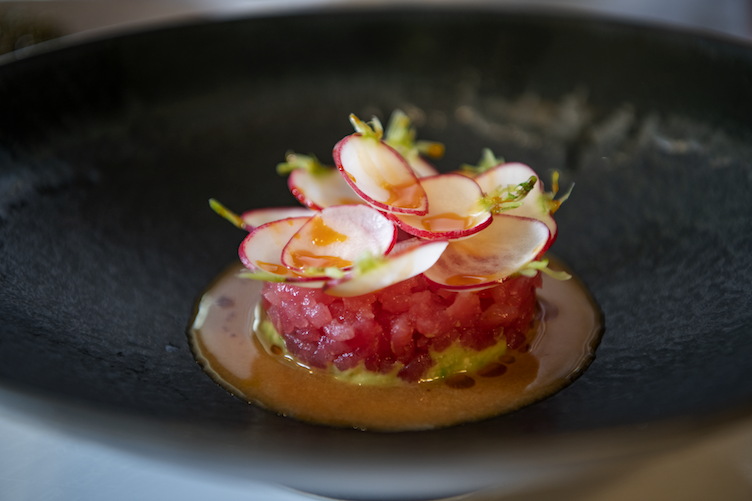
Photo Credit: Scott McDermott
JEAN-GEORGES VONGERICHTEN: HOW I GIVE BACK
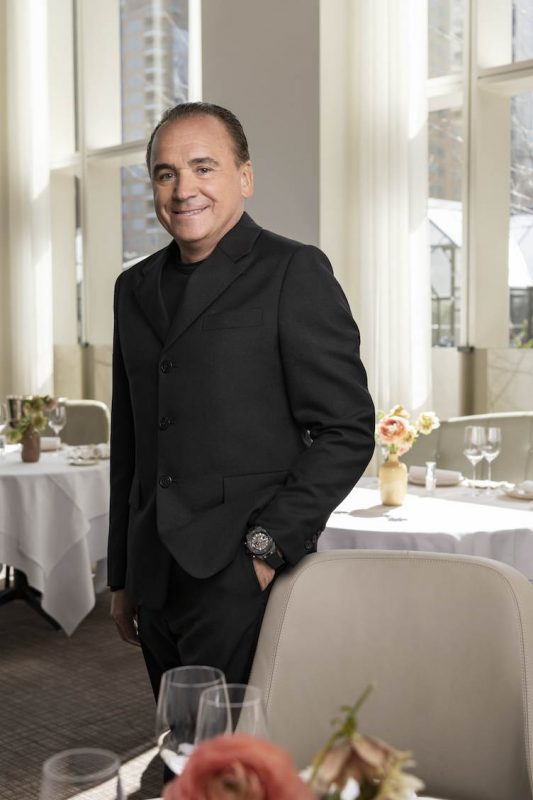
Photo Credit: Scott McDermott
“It has always been important to me to give back to the restaurant industry and those in need. In 2016, with my daughter Louise, I founded Food Dreams, a nonprofit foundation that aims at helping passionate individuals throughout the world gain access to culinary education and career opportunities in the restaurant industry that would otherwise be out of reach. However, because schools have been closed more or less since the beginning of the pandemic, this year we used the funding to buy products to donate to Food Bank for New York City. We provided bags of pantry staples such as rice, lentils, tomatoes, frozen meat and potatoes to families in need. One bag contained enough to feed a family of four for a week. We started doing this in May 2020, and it went through the end of the year. Additionally, when we announced that we were closing the restaurants in March of last year, we emptied our fridges and gave all the food to our staff. It was a great moment, knowing that we could help our team ahead of a daunting time. We have also maintained a strong relationship with our farmers, continuing to buy from them throughout the pandemic and supporting them in any way we can, whether it’s on social media or via word of mouth.”
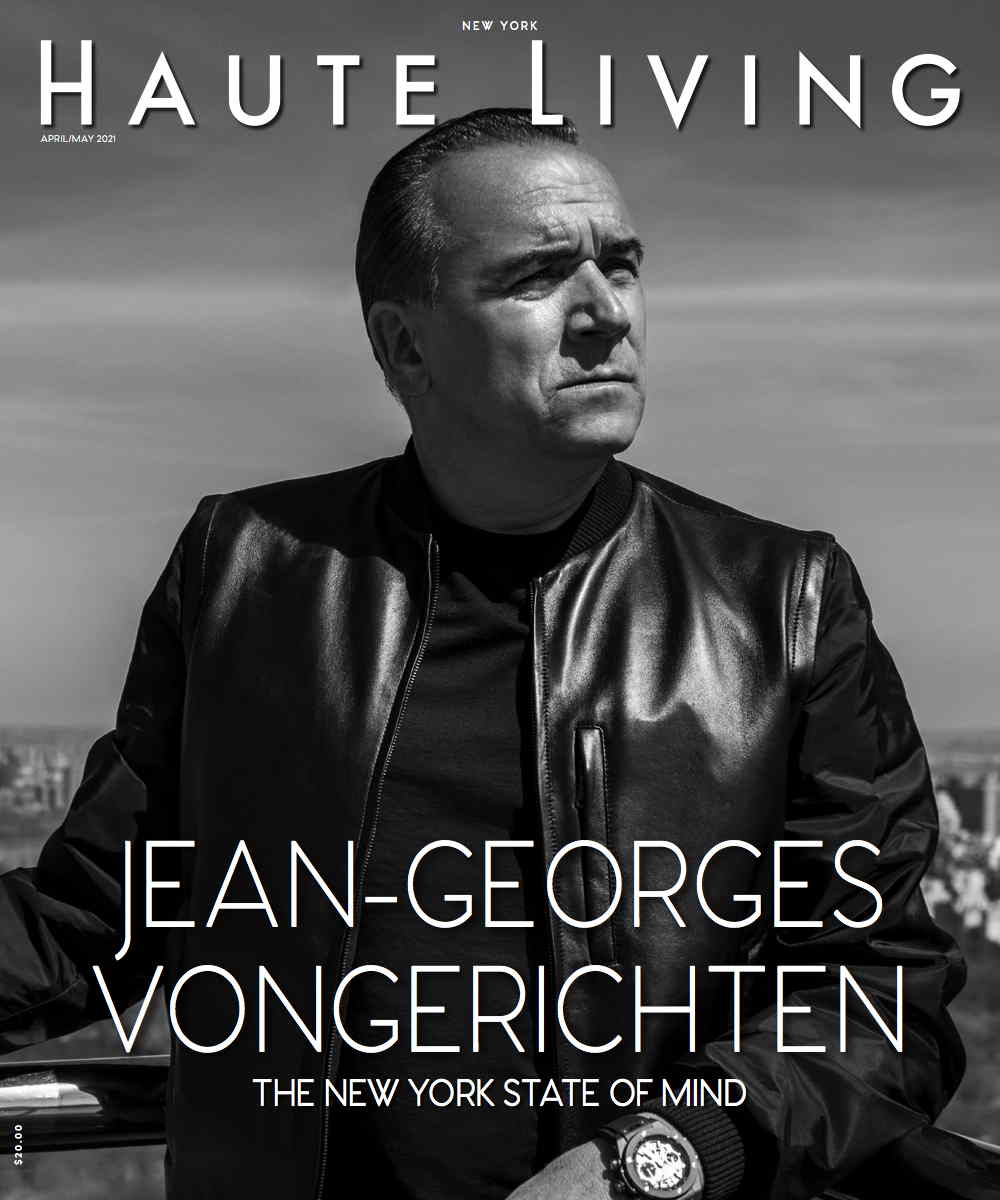
Photo Credit: Scott McDermott



